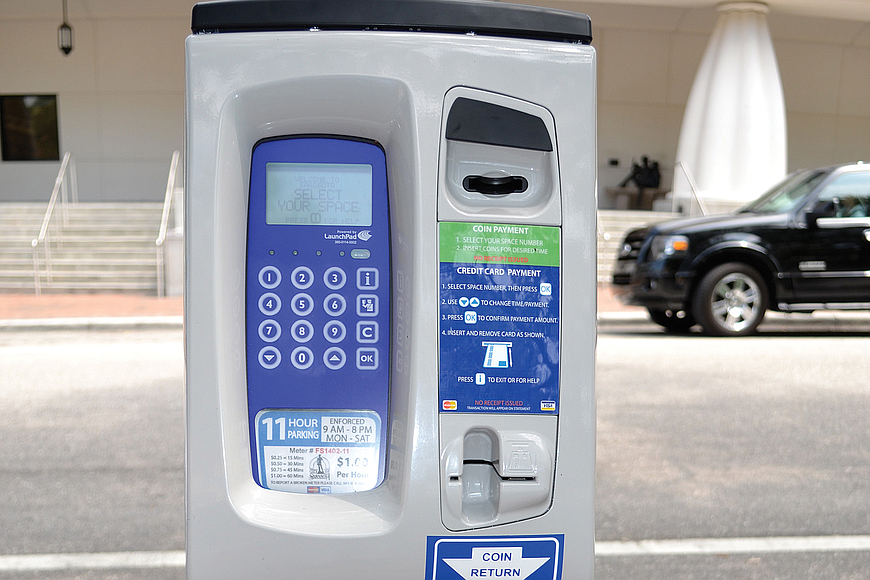- May 10, 2025
-
-
Loading

Loading

Tasked with devising a plan for bringing back paid parking in the city, Sarasota Parking Manager Mark Lyons knew public opposition to his work was inevitable.
It’s hard to find a broad group of advocates for the cause, a challenge he can boil down to a simple rhetorical question: “Who wants paid parking?”
In May, the City Commission directed Lyons to begin work on implementing a citywide parking management strategy — which, among other things, would include the return of parking meters in certain areas. That same month, Lyons reconvened the citizen Parking Advisory Committee to begin discussing the best way to put a plan in place.
Since May, that public opposition has begun to emerge. At the first PAC meeting, one resident questioned why the city was bringing back parking meters. At a June 14 meeting, the number of speakers grew to seven, most of them critical of paid parking. On Tuesday, five more people spoke out against the city’s plans.
Chip Beeman, the owner of Main Bar and Pastry Art on Main Street, was one of the people to express his belief that paid parking is a bad idea. He says he’s not alone, particularly among business owners who could be impacted. A survey of Sarasota Downtown Merchants Association members on the subject generated about 140 responses. From that, 89% of respondents believed parking meters would hurt business.
The concern is tied to the last effort to install paid parking downtown. In 2011, the City Commission decided to give up on the program, pulling out the meters following strong public opposition. Merchants are still scarred by that experience, with several respondents sharing stories about how they lost thousands of dollars in revenue when the meters were there.
“The prior owner of Pastry Art told me he lost somewhere between 15 and 20% of sales during the parking meter thing,” Beeman said. “That equates to $10,000 per month.”
Lyons has repeatedly acknowledged massive flaws with the last attempt to install meters — although the utilization rates suggest people weren’t flocking away from downtown en masse because of paid parking, he says. Still, the purpose of the Parking Advisory Committee is to avoid the mistakes of the past. Done right, the group believes paid parking can be an asset for businesses.
At Tuesday’s meeting, PAC member Chris Gallagher listed the new precautions the city is taking this time around. An established parking professional, Lyons, is setting up the program. The meters will be vetted. There will be a greater effort to communicate enforcement times. The area in which meters will be installed is smaller, and paid parking will be implemented in phases to adapt to user behavior.
Although there might not be many vocal advocates for paid parking, Gallagher said there are people dissatisfied with the status quo in high-demand areas.
“It’s like having customers that went away: They don’t tell you they left; they just left.” — Chris Gallagher
“People will throw up their hands and say, ‘I will never find a parking space — I won’t go there,’” Gallagher said. “Those people don’t tend to show up at meetings. It’s like having customers that went away: They don’t tell you they left; they just left.”
Eileen Hampshire, a Palm Avenue merchant and a member of the PAC, thinks the magnitude of merchant opposition is overstated. Although they might be wary of the prospect of paid parking, they’re willing to listen to the argument in favor of the meters — or they’re fine deferring to city staff.
“When you talk to the merchants individually, most of them don’t care,” Hampshire said.
Those merchants who attended the PAC meeting expressed dismay that the group was proceeding with a paid parking plan despite the opposing voices.
“Pretty much, (Lyons) said ‘This group isn’t really here for you to voice your concerns,’” Beeman said. “‘This committee is here now to move forward with putting meters in.’”
“The meters will affect more than just the merchants. Empty storefronts mean job losses.” — Chip Beeman
Lyons did say the committee’s focus is on proceeding with a model for implementation. On Tuesday, the PAC endorsed a proposed phasing plan for paid parking, moving gradually from Main Street and Gulfstream Avenue to the county judicial complex during the course of half a year.
He says that doesn’t mean the public is shut off from the discussion, though. Lyons is meeting with the merchants association Thursday, and he’s already started talking to downtown businesses about paid parking and the evidence in support of it. He says the response he’s gotten from individual merchants has been more mixed than the survey results suggest, but he plans to disclose all of the input he’s gathered to the commission when it comes time to approve a plan.
“Yes, we’ve had positive and we’ve had negative feedback,” Lyons said. “But our committee — which worked on this project and truly studied it for three years — analyzed the benefits and the potential risks and believed moving forward with paid parking in the prime areas is better for our community in many different aspects.”
With low turnover rates in prime spaces and a long-standing deficit in the city’s parking fund, the PAC believes the current system is untenable. Lyons said he’s been unable to find any studies suggesting paid parking is detrimental to a community. Taking all of that into consideration, the group is confident paid parking will pay off. Things will be different than the last meter fiasco, they assured the critics.
Still, some merchants see the risk inherent to any change — and fear they’ll be the ones to pay the price if the system fails again.
“They’re gambling with our money,” Beeman said.